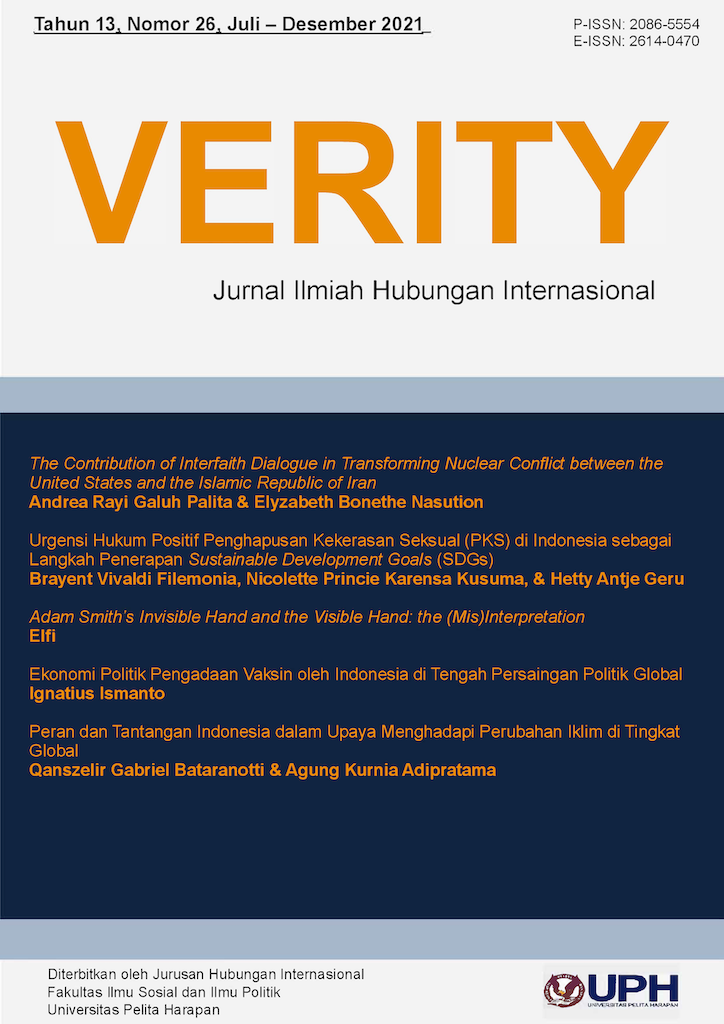Ekonomi Politik Pengadaan Vaksin oleh Indonesia di Tengah Persaingan Politik Global [The Political Economic Perspective of Vaccine Procurement in Indonesia in the Midst of Global Political Competition]
DOI:
https://doi.org/10.19166/verity.v13i26.5245Keywords:
Politik Global, Global Politics, Ekonomi Politik Internasional, International Political Economy, Politik Bebas Aktif, Free and Active PoliticsAbstract
The spread of COVID-19 has not only becoming a national issue but also a global issue. Vaccine are viewed as important means in preventing and/or stopping the spread of COVID-19. However, vaccine availability in the midst of the battle against the global pandemic is a highly uncertain situation. There are limited number of countries that can possibly produce the vaccine, such as the United States, China, India, Russia, and England. At the same time, this global pandemic is currently ongoing in between these powerful countries. Therefore, the distribution of the vaccine, which is a rare commodity nowadays, has become their instrument of diplomacy in expanding and strengthening their global influence. This paper uses political-economy approach in examining Indonesia’s efforts in vaccine procurement. This approach means that there are some efforts in combining the political and economy dimension to explain certain phenomenon. This approach is coming from an assumption that politics and economics are the two things that cannot be separated and both are influential towards each other. In this research, international political economy approach does not only take a look at the economic dimension of vaccine procurement, but also the political dimension about this policy. The political dimension taken by Indonesia can express its response regarding global political constellation that kept on developing. Indonesia’s strategy to avoid or to be somewhat independent from a specific country is also an interesting consideration. Vaccine procurement policy by Indonesia is also becomes a reflection from the free and active political foreign policy, where Indonesia has a tendency not to be too close with another competing countries, especially the major players.
Bahasa Indonesia Abstract: Penyebaran COVID-19 tidak hanya menjadi isu nasional bagi setiap negara tetapi juga telah menjadi isu global. Vaksin dipandang sebagai sarana yang penting dalam pencegahan dan atau menghentikan penyebaran COVID-19. Namun, ketersediaan vaksin dalam memerangi pandemi global itu dihadapkan pada situasi yang sangat tidak menentu. Produksi vaksin hanya memungkinkan dilakukan oleh sejumlah negara yang sangat terbatas, yaitu Amerika Serikat, China, India, Rusia dan Inggris. Penyebaran COVID-19 pada saat yang sama berlangsung di tengah persaingan pengaruh negara-negara besar itu. Distribusi vaksin, sebagai komoditi yang langka, karena itu menjadi instrumen diplomasi mereka dalam memperluas dan memperkuat pengaruh global negara-negara besar itu. Tulisan ini menggunakan pendekatan ekonomi-politik dalam mengkaji upaya yang ditempuh Indonesia dalam pengadaan vaksin. Pendekatan ekonomi politik yang dimaksudkan itu berupaya memadukan dimensi ekonomi dan dimensi politik dalam menjelaskan suatu fenomena. Pendekatan ekonomi-politik bertolak dari asumsi bahwa ekonomi dan politik merupakan dua hal yang tidak bisa dipisahkan dan saling mempengaruhi. Dalam kajian ini, pendekatan ekonomi-politik internasional tidak hanya melihat dimensi ekonomi dalam pengadaan vaksin, tetapi juga sekaligus melihat dimensi politik dari kebijakan pengadaan vaksin itu. Dimensi politik dalam pengadaan vaksin yang ditempuh Indonesia itu dapat dipandang sebagai respon terhadap konstelasi politik global yang tengah berkembang. Strategi Indonesia untuk menghindari atau tidak mengandalkan vaksin pada satu negara saja menjadi isu pertimbangan yang menarik. Kebijakan pengadaan vaksin yang ditempuh Indonesia itu sekaligus merupakan pencerminan suatu kebijakan politik luar negeri yang bebas aktif, di mana sikap Indonesia yang cenderung tidak ingin berpihak pada salah satu kekuatan besar yang tengah saling bersaing.
References
Ellwood, D. (2021, March 17). Vaccine Diplomacy: A New Chapter in The Story of Soft Power. Retrieved from Vaccine Diplomacy: A New Chapter in the Story of Soft Power | USC Center on Public Diplomacy (uscpublicdiplomacy.org)
El Kadi, T. H., & Zinser, S. (2021, February 2021). Beijing’s Vaccine Diplomacy Goes Beyond Political Rivalry. Retrieved from https://www.chathamhouse.org/2021/02/beijings-vaccine-diplomacy-goes-beyond-political-rivalry
Frazier, M. W. (2021, April 15). How India and China Are Using COVID-19 Vaccine Diplomacy to Compete Globally. Retrieved from https://scroll.in/article/992020/how-india-and-china-are-using-COVID-19-vaccine-diplomacy-to-compete-globally
Krasnyak, O. (2021, March 21). From Vaccine Nationalism to Vaccine Diplomacy. Retrieved from https://www.policyforum.net/from-vaccine-nationalism-to-vaccine-diplomacy
Marsudi, R. P. L. (2021, January 6). Recover Together Recover Stronger: Pernyataan Pers Tahunan Menteri Luar Negeri Tahun 2021. Retrieved from https://kemlu.go.id/portal/id/read/2048/berita/pernyataan-pers-tahunan-menteri-luar-negeri-tahun-2021
Ninomiya, S. (2021, April 4). Chinese “Vaccine Diplomacy” Amidst International Absence. Retrieved from http://www.sirjournal.org/blogs/2021/4/4/chinese-vaccine-diplomacy-amidst-international-absence
Prakoso, A., Azizah, I. B. N., & Hertanti R. (2021). Diplomasi Vaksin COVID-19 Indonesia: Tantangan Akses Publik atas Vaksin dan Layanan Kesehatan Berkeadilan. Retrieved from https://igj.or.id/diplomasi-vaksin-COVID-19-indonesia-tantangan-akses-publik-atas-vaksin-dan-layanan-kesehatan-berkeadilan/
Seong, H. C. (2021, February 4). How the Pandemic Undermined US Hegemony in Asia Pacific: The COVID-19 Vaccine War and The South China Sea. Retrieved from https://www.internationalaffairshouse.org/how-the-pandemic-undermined-us-hegemony-in-asia-pacific-the-COVID-19-vaccine-war-and-the-south-china-sea/
Susanthi, S. (2020). Kontestasi Negara di Tengah Pandemi COVID-19. Jurnal Ilmiah Widya Sosio Politika, 2(2).
Woertz, E., & Yellinek R. (2021, April 21). Vaccine Diplomacy in MENA Region. Retrieved from https://www.mei.edu/publications/vaccine-diplomacy-mena-region
Yamin, K. (2020, September 19). Indonesia Seeks Own Vaccine, Rather than Rely on Sinovac. Retrieved from https://www.universityworldnews.com/post.php?story=20200915121452749
Downloads
Published
Issue
Section
License
Authors who publish with this journal agree to the following terms:
1) Authors retain copyright and grant the journal right of first publication with the work simultaneously licensed under a Creative Commons Attribution License (CC-BY-SA 4.0) that allows others to share the work with an acknowledgement of the work's authorship and initial publication in this journal.
2) Authors are able to enter into separate, additional contractual arrangements for the non-exclusive distribution of the journal's published version of the work (e.g., post it to an institutional repository or publish it in a book), with an acknowledgement of its initial publication in this journal.
3) Authors are permitted and encouraged to post their work online (e.g., in institutional repositories or on their website). The final published PDF should be used and bibliographic details that credit the publication in this journal should be included.


